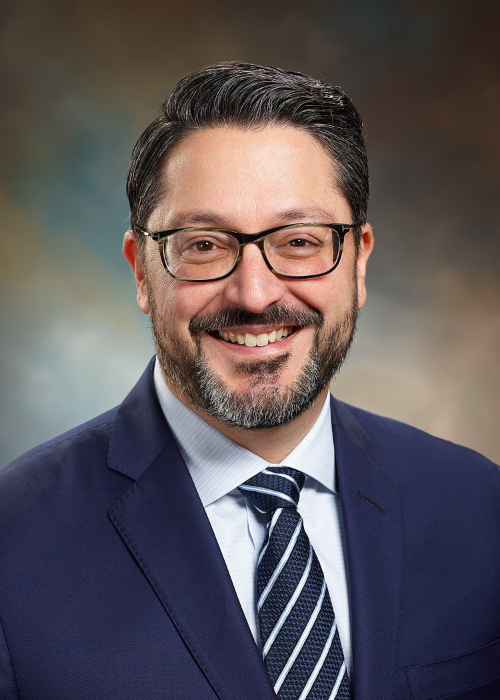Expanding Equity
Institutional Investor at the DEI Roundtable recognized 12 industry leaders for their work in, commitment to and leadership for diversity. Here are some excerpts from our conversation with Carlos Rangel.
As W.K. Kellogg Foundation’s Chief Investment Officer since 2021, Carlos Rangel has taken to heart the work of breakfast cereal creator Will Keith Kellogg, who created the foundation in 1930 “to invest his money in people.” The story of the foundation’s founder is based in its inception during the Great Depression in Battle Creek, Michigan, once the hub of 80 cereal companies. Carlos is a graduate the University of Michigan-Dearborn, where he received his Bachelor's in Business Administration and his Master of Science in Finance.
Carlos arrived at the $8.5 billion foundation as a Portfolio Manager in 2010. In addition to his investment roles at the foundation over the years, he co-created the Expanding Equity program in 2019, which focuses on advancing racial equity, diversity and inclusion in the corporate sector. To date, it has engaged more than 550 leaders from nearly 100 companies from 10 industries. More than 30 private equity, investment and financial services firms are a part of the program, who collectively have more than $19.7 trillion assets under management as of 2022.
The following has been edited for clarity.
 What does diversity, equity, and inclusion mean to you and your institution?
What does diversity, equity, and inclusion mean to you and your institution?
Race, ethnicity, gender, sexual orientation, national origin, disabilities, and socioeconomic background should not be the determinants of a person’s experience within a just company. A focus on equity enables the mindsets, habits and systems to create that experience.
Our board has been completely transformed, in terms of representation when it comes to race, gender, and ethnicity: It’s now 90% diverse, and our U.S.-based staff is more than 45% diverse when it comes to race and ethnicity. It’s been a 15-year arc since the foundation committed to deliberately being an anti-racist organization that promotes racial equity. There are a couple of factors that I like to highlight. The first is working with a recruiter that understands that having a diverse team is a top priority. The second thing I want to highlight is this idea of psychological safety: Is it safe to be included in the group? Is it psychologically safe to be a contributor to the group? Is it safe to be a learner within the group, to be vulnerable that you don’t know something and you’re in that group to learn? And finally, is it safe to be a challenger?
What kind of feedback have you received?
In 2018, I was at a number of meetings with managers. I proposed to the foundation that we had this unique opportunity of being the investment team that could be a bridge between our investment managers and the philanthropic work that we did because the two worlds don’t often connect. In 2019 we created the Expanding Equity program with an external consultant, suggesting to our investment managers 20+ initiatives that they could do within four specific work streams (pillars), and one of the things we mentioned is you can’t do just one because they work together.
The first was around recruiting; the second was around creating a culture where people feel like they belonged, that they were valued and respected; the third one was around fair promotion practices; and the fourth one was around, “How do you think about your place within the ecosystem?” We call it attract, belong, promote and influence.
We convinced five brave firms to join us in a pilot cohort in 2020, and the promise that we made was, “We’re going to create actionable DEI strategies and tactics that would be relevant for their organizations.”
The condition that we had for this program was, “We’re giving this to you for free, and it’s very valuable. We’re paying for it with grants because we think it’ll make for a better workplace, which leads to a better world, which is better for children in this country, so in exchange for that, we’re asking for your time: You need to commit C-Suite or senior-level people; you need to involve HR people to be a technical resource; and you need to be willing to make DEI initiatives a top priority for the firm.”
That cohort of five blossomed into a program that includes nearly 100 companies that employ 4.5 million people.
What is your proudest accomplishment?
We’ve piloted an internship program at WKKF that emphasized diverse career pathways, bringing in two people that were in the early stages of their undergraduate journey, to introduce them to, and build their excitement around, financial services.
Then, on the Expanding Equity side, we’re building a microsite that’s going to incorporate the experience that we had from this very large project, to create a learning journey for companies and leaders that choose to go through it.
How do you see diversity expanding?
What we hear from employees at the firms is that allocators asking about diversity helps make DEI a priority. Generally, managers are interested in engaging and moving in the right direction, but struggle to find the appropriate next steps.
The question becomes, “How do you make this winnable and something the organization can be proud of?” Using the foundation’s DEI journey as an example, beyond the intellectual understanding of the challenge, leaders and employees need to find their “why” to engage with this work. What will motivate people to lean into the work and be willing to be uncomfortable in this space because it’s the right thing to do, from a human-being and from a business perspective?
For the full list of DEI Award winners, visit Allocator Intel here.
To discuss the content of this article or gain access to like content, log in or request membership here.
